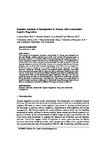Bayesian Analysis of Immigration in Europe with Generalized Logistic Regression
| dc.contributor.author | Dalla Valle, Luciana | |
| dc.contributor.author | Leisen, F | |
| dc.contributor.author | Rossini, L | |
| dc.contributor.author | Zhu, W | |
| dc.date.accessioned | 2019-07-07T10:24:26Z | |
| dc.date.issued | 2019-07-18 | |
| dc.identifier.issn | 0266-4763 | |
| dc.identifier.issn | 1360-0532 | |
| dc.identifier.uri | http://hdl.handle.net/10026.1/14607 | |
| dc.description.abstract |
The number of immigrants moving to and settling in Europe has increased over the past decade, making migration one of the most topical and pressing issues in European politics. It is without a doubt that immigration has multiple impacts, in terms of economy, society and culture, on the European Union. It is fundamental to policy-makers to correctly evaluate people's attitudes towards immigration when designing integration policies. Of critical interest is to properly discriminate between subjects who are favourable towards immigration from those who are against it. Public opinions on migration are typically coded as binary responses in surveys. However, traditional methods, such as the standard logistic regression, may suffer from computational issues and are often not able to accurately model survey information. In this paper we propose an efficient Bayesian approach for modelling binary response data based on the generalized logistic regression. We show how the proposed approach provides an increased flexibility compared to traditional methods, due to its ability to capture heavy and light tails. The power of our methodology is tested through simulation studies and is illustrated using European Social Survey data on immigration collected in different European countries in 2016–2017. | |
| dc.format.extent | 424-438 | |
| dc.language | en | |
| dc.language.iso | en | |
| dc.publisher | Taylor & Francis (Routledge) | |
| dc.title | Bayesian Analysis of Immigration in Europe with Generalized Logistic Regression | |
| dc.type | journal-article | |
| plymouth.issue | 3 | |
| plymouth.volume | 47 | |
| plymouth.publication-status | Published | |
| plymouth.journal | Journal of Applied Statistics | |
| dc.identifier.doi | 10.1080/02664763.2019.1642310 | |
| plymouth.organisational-group | /Plymouth | |
| plymouth.organisational-group | /Plymouth/Faculty of Science and Engineering | |
| plymouth.organisational-group | /Plymouth/REF 2021 Researchers by UoA | |
| plymouth.organisational-group | /Plymouth/REF 2021 Researchers by UoA/EXTENDED UoA 10 - Mathematical Sciences | |
| plymouth.organisational-group | /Plymouth/REF 2021 Researchers by UoA/UoA10 Mathematical Sciences | |
| plymouth.organisational-group | /Plymouth/Users by role | |
| plymouth.organisational-group | /Plymouth/Users by role/Academics | |
| dcterms.dateAccepted | 2019-07-05 | |
| dc.rights.embargodate | 2020-7-17 | |
| dc.identifier.eissn | 1360-0532 | |
| dc.rights.embargoperiod | Not known | |
| rioxxterms.version | Accepted Manuscript | |
| rioxxterms.versionofrecord | 10.1080/02664763.2019.1642310 | |
| rioxxterms.licenseref.uri | http://www.rioxx.net/licenses/all-rights-reserved | |
| rioxxterms.licenseref.startdate | 2019-07-18 | |
| rioxxterms.type | Journal Article/Review |


